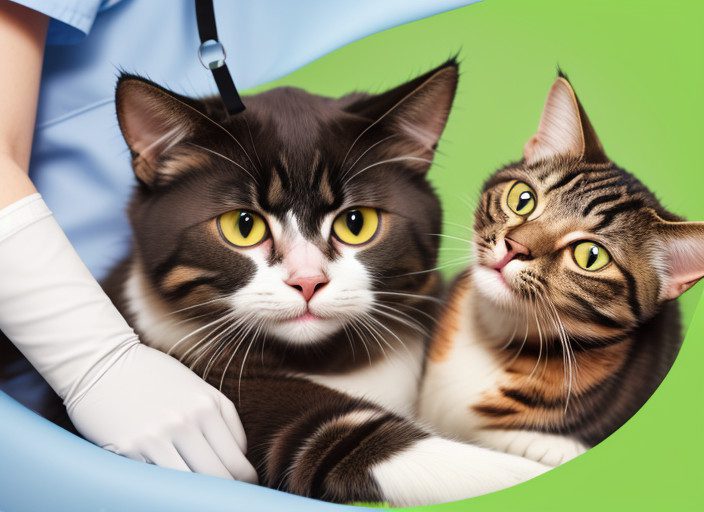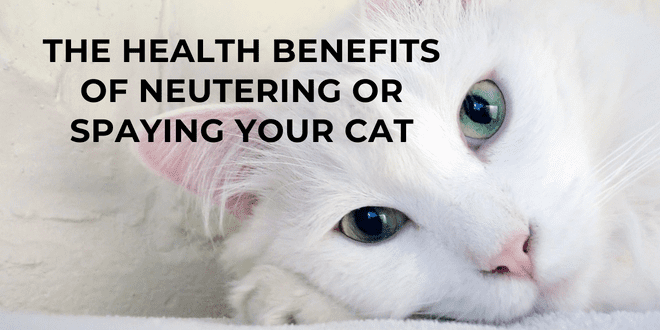The Health Benefits Of Neutering A Cat: Neutering a cat can provide numerous health benefits, including reducing the risk of certain cancers and infections, as well as behavioural problems. Cats are among the most popular pets in the world, and for good reason.

They are adorable, independent, and make great companions. However, owning a cat also comes with certain responsibilities, including ensuring their health and well-being. One important aspect of cat care is neutering, a surgical procedure that removes a male cat’s testicles or a female cat’s ovaries and uterus.
Neutering can provide numerous health benefits for cats, including reducing the risk of certain cancers and infections, as well as behavioural problems. We will explore the various health benefits of neutering a cat and why it is an important part of cat care.
The Importance Of Neutering
Neutering a cat is a crucial aspect of responsible pet ownership, with a multitude of benefits that extend beyond just preventing unwanted litters. By understanding the importance of neutering, cat owners can contribute to the overall well-being of their feline companions. Let’s delve into the various health benefits associated with neutering cats.
Preventing Overpopulation
Neutering is a proactive measure to address the issue of pet overpopulation, which has far-reaching consequences. By spaying female cats and neutering male cats, the cycle of uncontrolled breeding can be halted, ultimately reducing the number of stray and homeless cats in the community. This not only alleviates the burden on animal shelters but also helps in creating a more sustainable and balanced pet population.
Reducing The Risk Of Certain Diseases
Neutering plays a pivotal role in mitigating the risk of various health conditions in cats. For female cats, spaying significantly reduces the likelihood of uterine infections and breast tumors, while for male cats, neutering decreases the incidence of testicular cancer and lowers the risk of prostate issues. By taking this proactive step, cat owners can effectively safeguard their pets from the potential health complications associated with reproductive system-related diseases.
Behavioural Benefits
Neutering a cat offers various health benefits, including behavioural improvements that can enhance the quality of life for both the feline and its owner. Understanding the behavioural benefits of neutering is crucial for cat owners to make informed decisions about their pet’s well-being.
Decreased Roaming Tendencies
Neutering can significantly reduce a cat’s urge to roam, which is beneficial for their safety and well-being. Roaming tendencies in intact male and female cats are often driven by the instinct to seek a mate. By neutering, this instinctual behaviour is lessened, resulting in a reduced likelihood of the cat wandering away from home. This not only lowers the risk of accidents and injuries but also minimizes the chances of the cat getting into altercations with other animals or encountering dangerous situations outdoors.
Diminished Aggression
Neutering can lead to a decrease in aggressive behaviour in cats. Unneutered male cats, in particular, may display territorial aggression and frequent fighting as they compete for mates. By neutering, the levels of testosterone decrease, which can help mitigate these aggressive tendencies. This can create a more harmonious environment within the home, reducing the likelihood of conflicts with other pets and aggressive behaviour towards humans. Additionally, neutering can contribute to a calmer and more relaxed demeanour, promoting a happier and healthier relationship between the cat and its owner.
Health Benefits
Neutering a cat has numerous health benefits that can contribute to a longer, healthier life for your feline companion. From reducing the risk of reproductive cancers to preventing urinary tract infections, the decision to neuter your cat can have a positive impact on their overall well-being.
Lowered Risk Of Reproductive Cancer
Neutering significantly reduces the risk of reproductive cancers in cats. Female cats are less likely to develop mammary tumours, while male cats have a lower incidence of testicular cancer after being neutered. This simple procedure can effectively minimize the potential for these serious health issues, allowing your cat to lead a healthier and longer life.
Prevention Of Urinary Tract Infections
Neutering also plays a key role in preventing urinary tract infections in cats. Male cats, in particular, are less likely to develop urinary issues such as crystals or blockages after being neutered. This can help avoid painful and potentially life-threatening conditions, ensuring your cat’s urinary health remains optimal.


Post-neutering Care
Post-neutering care is crucial to ensure the well-being of your cat. After the surgical procedure, it’s important to monitor for complications, make adjustments to diet and exercise, and provide a comfortable environment for recovery.
Monitoring For Complications
After neutering your cat, it’s essential to monitor for any signs of complications. Keep an eye out for excessive bleeding, swelling, or signs of infection around the incision site. If you notice any abnormal behaviour or symptoms, contact your veterinarian immediately for further guidance.
Adjusting Diet And Exercise
Neutering can lead to changes in metabolism and energy levels. It’s important to adjust your cat’s diet and exercise routine to prevent weight gain. Consult with your vet to determine the appropriate amount of food and the best type of diet for your neutered cat. Additionally, regular exercise is crucial to maintaining a healthy weight and overall well-being.
Neutering Myths Debunked
Neutering myths debunked reveal the truth behind common misconceptions surrounding the procedure.
Impact On Weight Gain
Neutering does not directly cause weight gain; rather, it may lead to a slower metabolism in some cats.
Proper diet and exercise are crucial in managing weight post-neutering to prevent obesity.
Effect On Personality
Neutering does not change a cat’s fundamental personality but may reduce aggressive behaviours in some cases.
Cats may become more affectionate and less territorial after being neutered.
Timing Considerations
When considering the health benefits of neutering a cat, timing is a crucial factor to take into account. The age at which a cat is neutered can significantly impact its overall health and well-being. It’s essential to understand the ideal age for neutering and the benefits of early neutering to make informed decisions for your feline companion.
Ideal Age For Neutering
The ideal age for neutering a cat is between 4 to 6 months old. At this stage, cats are sexually mature, and early neutering can help prevent unwanted behaviours such as spraying, yowling, and aggression. It also reduces the risk of certain reproductive-related health issues, such as uterine infections and testicular cancer.
Benefits Of Early Neutering
Early neutering can have several positive effects on a cat’s health and behaviour. It can help reduce the likelihood of roaming, fighting, and injuries, which in turn lowers the risk of contracting contagious diseases such as feline immunodeficiency virus (FIV) and feline leukaemia virus (FeLV). Additionally, early neutering can contribute to controlling the population of stray and feral cats, thereby benefiting the overall community.
Cost-effectiveness Of Neutering
Neutering a cat not only benefits the health of your feline friend but also proves to be a cost-effective choice in the long run. The financial savings associated with neutering extend beyond the initial procedure, leading to reduced healthcare expenses and stray cat management costs.
Long-term Savings On Healthcare
Neutering your cat can lead to lower healthcare costs over time. Preventive health benefits such as reduced risk of certain cancers and infections can help avoid expensive medical treatments.
Reduced Stray Cat Management Costs
Neutering decreases the population of stray cats, which can lower the costs associated with managing feral colonies and addressing issues related to overpopulation.
Addressing Common Concerns
Addressing Common Concerns
Anesthesia Risks
Before neutering your cat, you may worry about anaesthesia risks.
Rest assured, veterinarians take precautions to minimize any potential risks.
- Discuss any concerns with your vet beforehand.
- Ensure your cat is properly monitored during the procedure.
- Follow post-operative care instructions carefully.
Recovery Process
Understanding the recovery process can ease your worries.
After neutering, your cat may need a quiet space to rest and heal.
- Monitor their incision site for any signs of infection.
- Provide pain medication as prescribed by the vet.
- Encourage gentle activity once the vet gives the green light.


Frequently Asked Questions
Is Neutering A Cat Good For Its Health?
Yes, neutering a cat can be good for its health. It can reduce the risk of certain types of cancer and infections, as well as decrease aggressive behaviour and the urge to roam. It can also help control the cat population and prevent unwanted litter.
Do Cats Act Better After Being Neutered?
Yes, cats typically act better after being neutered. Neutering can reduce aggressive behaviour, decrease the urge to roam, and prevent certain health issues. It also helps control the cat population and can improve their overall quality of life.
Does Neutering Have Health Benefits?
Neutering has health benefits for pets, including reducing the risk of certain cancers and behavioural issues.
Do Cats Get Friendlier After Being Neutered?
Neutering can make cats friendlier due to reduced hormonal aggression, but individual personalities vary.
What Are The Health Benefits Of Neutering A Cat?
Neutering helps prevent certain cancers, reduces aggression, and curbs unwanted behaviours in cats.
Conclusion
Neutering your cat offers numerous health benefits, from preventing certain cancers to reducing roaming tendencies. It’s a responsible choice that can improve your cat’s quality of life and contribute to overall pet population control. Consider the positive impact of neutering on your feline friend’s well-being.
